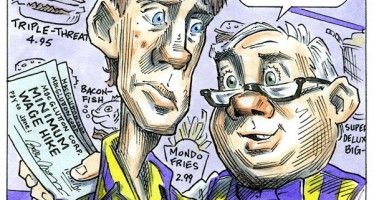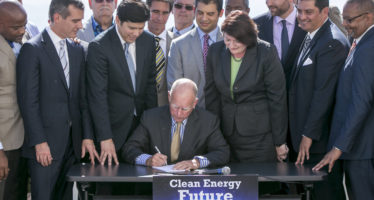Fast-tracking personal info
MAY 28, 2010
By KATY GRIMES
Are transportation agencies selling California drivers’ personal information?
Commuters on California toll roads and highways subscribe to a device kept in the car, allowing electronic toll collection as they pass through a toll booth. Payment is made by credit card.
Sen. Joe Simitian, D-Palo Alto, wants to not only prevent this information from being sold, he is proposing in that state agencies dump all data collected on subscribers every six months.
Simitian’s SB1268 protects the privacy of drivers in California by controlling the personal information collected and stored by electronic toll collection systems. The bill also addresses the need for a civil remedy, for any drivers whose personal information is released.
Agencies such as FasTrack, the Bay Area Toll Authority and the California Department of Transportation insist that they do not sell the information, nor have there ever been public allegations of such privacy violations.
In the Senate Appropriations Committee this week, Simitian defended his bill because of the need to protect the privacy of subscribers to the toll systems. Sen. Jeff Denham, R-Merced, asked if it was a bill searching for a purpose since there have been no incidents or allegations of privacy violations, and the agencies do not sell the information.
Simitian argued that keeping the personal account information in perpetuity could lead to problems.
(CLARIFICATION, PER TCA): “Transportation Corridor Agencies (TCA) representatives said that the statute of limitations of California’s consumer protection laws compel the agencies to maintain the account information of subscribers for at least four years in order to address claims and disputes. Performing a data dump every six months would put the agencies into an untenable situation by denying the agencies and their customers the data needed to either support or refute any future claims initiated under Business and Professions Code 17200.”
Leland Yee, D-San Francisco, opined to agency representatives, “You are violating our privacy.” Yee added that he felt “Big Brother is always present.”
Mark Wyland, R- Escondido, said that there are many other agencies Simitian had not yet addressed, where information is already being sold.
Simitian’s office gave more in depth information about SB1268, explaining that the reason for the bill is because of the content of the information and data collected – it’s not just the credit information of subscribers, but includes data that tracks drivers’ whereabouts. Not only are drivers are photographed at tollbooths, sensors in the road track where drivers have been, which is then stored by transit agencies. Simitian doesn’t want this information stored indefinitely.
Simitian has proposed numerous privacy legislation bills including SB20, which would have required notification to California residents when a security breach by a public agency occurs. The bill was vetoed in 2009 by Gov. Arnold Schwarzenegger.
The Department of Finance said that there would be no cost to the state for SB1268. The bill passed out of the Appropriations committee on a 6-3 vote.
Related Articles
Potential break-up of PG&E looking less likely
Eight months after the head of the California Public Utilities Commission suggested it was time for a radical shake-up of
Taking on the minimum-wage debate in L.A.
The national debate over minimum-wage increases will take center stage in Los Angeles because two efforts to raise the
California Senate leader asked for Obama’s help on climate bill in 2015
Knowing that a major climate-change measure was in trouble, Senate President Pro Tempore Kevin de Leon sought help from the




